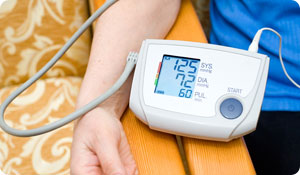
Is it possible to be overweight and feel healthy? Of course. It's even possible to fall into the clinical category "obese" and not suffer from one of the most common health problems associated with excessive weight: high blood pressure. In fact, with an optimal blood pressure reading, you may believe that you are healthier than others despite your weight. The relationship between body weight and blood pressure doesn't offer such clear guarantees, though.
Healthy Blood Pressure: It's a Good Start
The Center for Disease Control defines obesity as having a body mass index of 30 or higher. This translates into approximately 203 pounds for a five-foot nine-inch adult. If you're obese, you can have a normal blood pressure reading of 120/80 mm Hg or less. However, having optimal blood pressure doesn't offer any special protection against other obesity-related health complications. The fact is high blood pressure, also known as hypertension, is only one of the serious health problems that you're at risk for when you are obese. Having normal blood pressure won't reduce your likelihood of developing other conditions such as:
- Coronary heart disease
- Type 2 diabetes
- Cancer
- Stroke
- Liver and gallbladder disease
- Respiratory problems
- Osteoarthritis
You also won't be any less likely to suffer from other cardiovascular problems such as high levels of LDL (bad) cholesterol, low levels of HDL (good) cholesterol, or high triglycerides. What can help protect you is losing weight. Dropping just 5 to 10 percent of your weight can actually reduce your risk of developing obesity-related diseases.
Should You Worry About Blood Pressure Being Too Low?
While a normal blood pressure reading doesn't provide any special defense against other problems, it is a positive sign. Just because obese individuals often have hypertension does not mean that it is "normal" for you to have a high reading. In other words, normal isn't the new low for anyone who is overweight or obese.
However, some individuals (obese or not) can suffer from hypotension or unusually low blood pressure. Robert Ostfeld, M.D., a cardiologist at Montefiore Medical Center in New York, notes that in obese people and the general population, extremely low blood pressure is significantly less common a condition than hypertension or normal blood pressure, but when the condition does occur, it can be dangerous. "Those situations," he says, "may lead someone to feel faint or dizzy or pass out."
When blood pressure drops, it's often associated with a sudden event such as loss of blood, an allergic reaction, dehydration, or severe infection. You could also be at risk of hypotension if you suffer from an under-active thyroid, adrenal insufficiency (Addison's disease), B-12 deficiency, heart problems, or are pregnant. In some instances, diabetes may also increase your chances of developing hypotension.
Dr. Ostfeld says that he is not aware of any direct link between obesity and dangerously low blood pressure. However, if you have had fainting episodes or dizziness, you may want to discuss with your doctor whether obesity-related medical problems or lifestyle factors could be causing hypotension.
Sources:
"Assessing Your Weight and Health Risk." National Heart, Lung and Blood Institute. n.d. Web. March 22, 2012
http://www.nhlbi.nih.gov/health/public/heart/obesity/lose_wt/risk.htm
"Low Blood Pressure." American Heart Association. n.d. Web. March 22, 2012
http://www.heart.org/HEARTORG/Conditions/..re_UCM_301785_Article.jsp
"Overweight and Obesity." Center for Disease Control. March 3, 2011. Web. March 22, 2012
http://www.cdc.gov/obesity/causes/health.html





